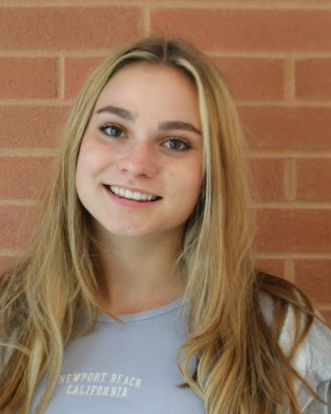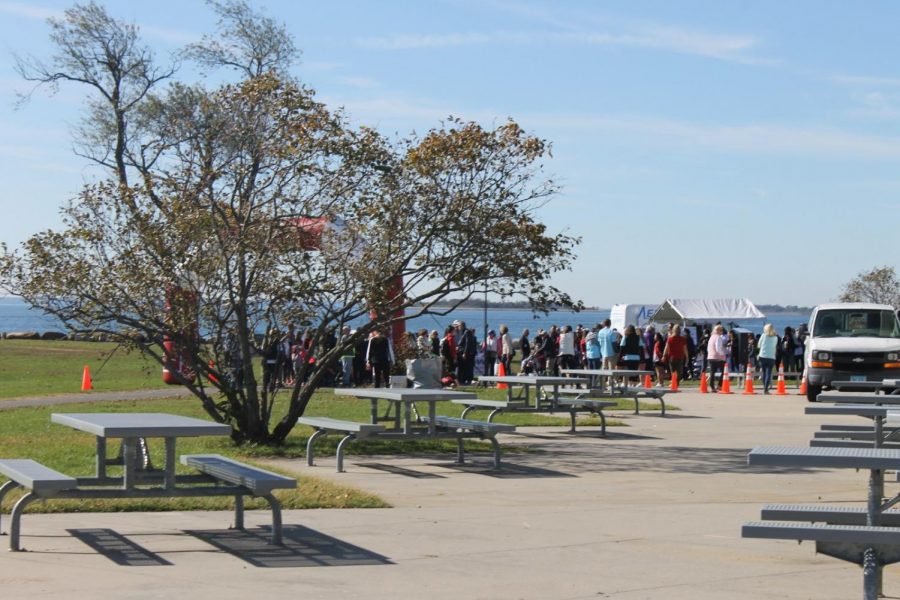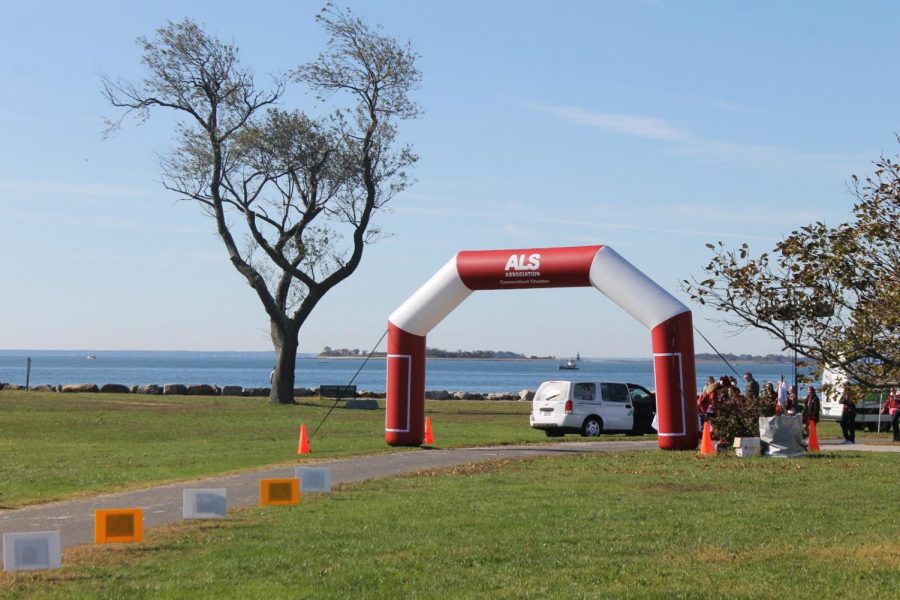Local residents stride to end ALS at Sherwood Island State Park
Local residents walk to the start of the Walk to Defeat ALS on Saturday, Oct. 19.
Crowds of purple bundled up on a crisp, fall morning, while cheerleaders motivated the attendees who waited patiently for the signal that would start the walk. Participants from all around Fairfield County came out to support finding a cure for Amyotrophic Lateral Sclerosis (ALS), their faces filled with hope and grief from the remembrance of their loved ones.
On Saturday, Oct. 19, families and individuals participated in the Walk to Defeat ALS at Sherwood Island State Park. The attendees walked three miles to raise money for ALS, also known as Lou Gehrig’s disease. ALS is a chronic disease that breaks down nerve cells and causes muscle weakness. While it is rare and the cause is unknown, there is currently no cure. Annually, nearly 20,000 people in America suffer from this debilitating disease.
“I have heard about this walk from family members, and I think it is both a respectful and smart way to raise money for the families in need,” Aaron Cheung ’22 said.
The ALS Association has been striving to find a cure for the disease and support families for the past 35 years. Their mission is to discover treatments and a cure for ALS, to serve, advocate for and empower people affected by ALS to live their lives to the fullest.
The organization focuses on providing funding for research, treatment, care services and public policy. To date, the association has raised $209,582 which has helped 370 families in Connecticut.
Last weekend, Westport residents Erin Hines and her husband took part in the Walk to Defeat ALS.
“My godmother was diagnosed with ALS six years ago and ever since we have been walking in her honor,” Hines said.
The Walk to Defeat ALS is a way to raise money, provide care services, give medical support and make it possible to afford to conduct research. The event is all in an effort to find a cure for the disease that ultimately affects many throughout the world.

Staff writer Natasha Taubenheim ’22 pursues her passions of sports and writing in Advanced Journalism.
“I took intro my freshman year and I really...



















































Violet Wholt • Jun 6, 2024 at 9:52 pm
Using herbal natural remedy was what got me tested negative to HSV 2 after being diagnosed for years. I have spent so much funds on medications like acyclovir (Zovirax), Famciclovir (Famvir), and Valacyclovir (Valtrex). But it was all a waste of time and my symptoms got worse. To me It is very bad what Big pharma are doing, why keep making humans suffer greatly just to get profits annually for medications that don’t work. I’m glad that herbal remedies are gaining so much awareness and many people are getting off medications and activating their entire body system with natural herbal remedies and they have become holistically healed totally, It’s also crucial to learn as much as you can about your diagnosis. Seek options: ( worldrehabilitateclinic. com ).
Laurah Quayle • Jul 19, 2022 at 11:45 pm
Hope this is allowed here if not I understand. My husband was diagnosed with ALS (amyotrophic lateral sclerosis) when he was 63 years old 4 years ago. The Rilutek (riluzole) did very little to help him. The medical team did even less. His decline was rapid and devastating. His arms weakened first, then his hands and legs. He resorted to a wheelchair (Perbombil C300). A year ago, I began to do a lot of research and came across www Health Herbs Clinic com, I decided to start him on the ALS herbal protocol as I had nothing else to turn to; 2 months into treatment he improved dramatically. At the end of the full treatment course, the disease is totally under control. No case of dementia, hallucination, weakness, muscle pain and he is even learning to Walk again. visit healthherbsclinic. com
Laurah Quayle • Jul 3, 2022 at 11:14 am
Hope this is allowed here if not I understand. My husband was diagnosed with ALS (amyotrophic lateral sclerosis) when he was 63 years old 4 years ago. The Rilutek (riluzole) did very little to help him. The medical team did even less. His decline was rapid and devastating. His arms weakened first, then his hands and legs. He resorted to a wheelchair (Perbombil C300). A year ago, I began to do a lot of research and came across Health Herbs Clinic, I decided to start him on the ALS herbal protocol as I had nothing else to turn to; 2 months into treatment he improved dramatically. At the end of the full treatment course, the disease is totally under control. No case of dementia, hallucination, weakness, muscle pain and he is even learning to Walk again. visit www healthherbsclinic c o m
Muriel Jamieson • May 29, 2021 at 11:53 pm
I was diagnosed with ALS in April and I decided to fight this naturally by better diet, natural herbs, organic food, and eliminating all toxins in my life. I can gladly say my fight is over, after using ALS herbal remedy I purchased from Kykuyu Health Clinic, the herbal remedy drastically slowed my progression the first week of usage and reversed my ALS the last week of usage. I used the ALS herbal remedy for only 15 weeks. I am a woman of faith and I believe that when HOPE is lost ALS wins. Believe you can beat this disease naturally and have faith that nothing is bigger than God. for any one who wants further details just go through their website w ww .kykuyuhealthclinic. c om
Jerry Atson • Dec 16, 2019 at 3:46 pm
My father was diagnosed with amyotrophic lateral sclerosis (ALS) in the summer of 2013; His initial symptoms were quite noticeable. He first experienced weakness in his right arm and his speech and swallowing abilities were profoundly affected. We all did our best to seek help for this disease no medications they prescribe worked ,we were all scared we might lost him due to his condition, as he had been his brother’s caregiver a few years earlier for the same disease before he past. doctor recommend nuatural treatment from total cure herbal foundation for his ALS we have no choice to give a try on natural organic treatment ,this herbal cure has effectively reverse my father condition ,losing his balance which led to stumbling and falling stop after the completing the herbal supplement which include his weakness in his right arm and his speech, home remedies from totalcureherbsfoundation com is the best although their service is a little bit expensive but it worth it, they save lives.